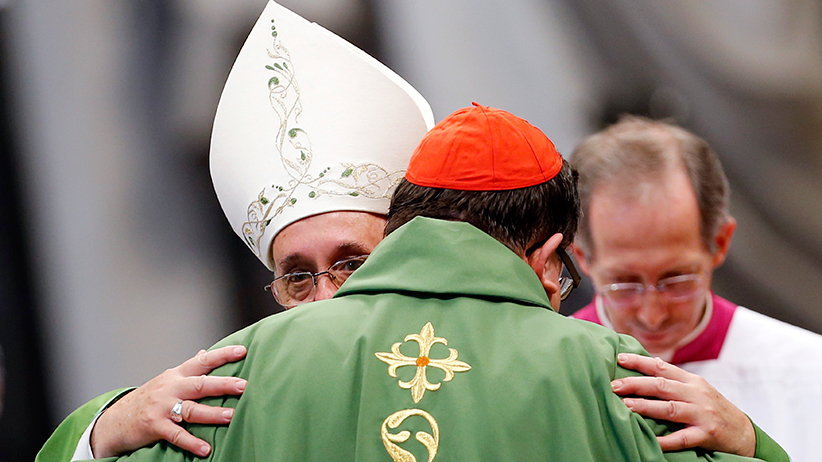‘Extraordinary’ synod ends with a nod to respect and sensitivity
The Church seemed poised to welcome home Catholic gays. Brian Bethune explains what happened.
Pope Francis greets Cardinal Gerald Cyprien Lacroix of Canada during a thanksgiving mass for Canadian Saints in St.Peter’s Basilica at the Vatican, October 12, 2014. Giampiero Sposito/Reuters
Share

For an organization that likes things slow, ordered and, above all, predictable, it’s been quite a week for the highest echelons of the Roman Catholic Church. It began halfway through the Oct. 4 to Oct. 19 “extraordinary” synod—a not regularly scheduled gathering of bishops and other interested (albeit non-voting) Catholics—when the Vatican released a relatio, a kind of summary of discussion so far. That is to say, a draft report of a draft report, itself slated to be debated across the Catholic world in the year leading up to the 2015 “ordinary” synod on the same topic: pastoral approaches to marriage and family issues in the contemporary world.
A handful of words — “accepting and valuing [homosexuals’] sexual orientations” and giving gays “a welcoming home” — signalled to non-Catholic observers and outraged traditionalist Catholics, if not perhaps to Catholic gays, a seismic shift in doctrinal stance, a new and more welcoming attitude toward homosexuality. In the end, the softer tone was abandoned, with the second draft saying only that gays “should be treated with respect and sensitivity,” standard Vatican language.
For liberal secular admirers of Pope Francis, focused on the same-sex issue and disappointed in their high expectations — impossibly high, for most Catholics — of the pontiff, it may mark the end of their honeymoon with him. Within Catholicism, where the other raging pastoral issue — the half-lives, in Church terms, of divorced and remarried laity — is a far more urgent concern, reactions will be mixed and more nuanced. Many of the more gay- and divorce-positive sections proposed for the final report did not receive the necessary two-thirds support required from the assembled prelates, the great majority of whom were appointed by Francis’s more traditionalist predecessors, but still picked up more than 50 per cent of the vote — creating unknown implications for the outcome of next fall’s ordinary synod. For Vatican observers, however, the most remarkable aspect of the two weeks was what happened between the first and second drafts.
Related post: Pope Francis: The unlikeliest liberal hero
Synods have always been tightly scripted, their proceedings more akin to those of the old Supreme Soviet than to the House of Commons. Now, in the wake of the relatio, conservative cardinals held press conferences to declare it bore no resemblance to the discussions as they recalled them. Traditionalist bloggers wondered whether the Church was tumbling into heresy, while their progressive counterparts urged the hierarchy—unmarried men pronouncing on marriage and family—to listen to the witness of married Catholics. Liberal cardinals, seemingly cobbling it together on the spot, talked to journalists about a theory of “gradualism,” by which the Church would openly proclaim what the sweep of its history reveals. Change does come, even to doctrine.
The leaked comments of an African bishop, his name carefully concealed, were widely disseminated to reveal his anguished prediction that the laity would flee Catholicism for “the evangelicals and even the Muslims,” while German Cardinal Walter Kasper retorted that homosexuality was such a “taboo” topic in Africa that the rest of the Church should simply ignore what the continent’s hierarchy had to say about it. Kasper in turn was denounced for First-World condescension toward what is the more burgeoning part of the Church, including by one commentator who clearly knew condescension when he saw it, who sniffed that “shepherds don’t seek animal husbandry advice from sheep.” Everyone complained of being censored, by which they seemed to mean people of opposing views were allowed to speak at all.
Related reading: Pope Francis is a man on a mission
Through it all, Pope Francis said nothing official, even in the face of demands he issue an authoritative statement of doctrine, and thereby encouraging an airing of differences perhaps not seen since the Second Vatican Council. But Vatican watchers interested in what is on Francis’s mind at any given time pay close attention to his ad-hoc homilies at daily mass. On Oct. 13 the Pope denounced “doctors of the law,” who created closed systems, forgetting that “God is the God of Law, but he also the God of surprises.”
He suggested, as food for thought, to the congregants that they should asked themselves, “I am attached to my things, my ideas — does this mean I am ‘closed?’ Or am I open to the God of surprises? Am I a person who stands still, or a person on a journey?” He repeated a version of those remarks, advising the prelates to search their hearts for rigidity, to the synod as it closed, prompting, according Dublin Archbishop Diarmuid Martin, a five-minute standing ovation from the bishops. The institutional Church may prefer the predictable, however it turns out, but the man at the top, who is clearly on a journey, loves surprises.